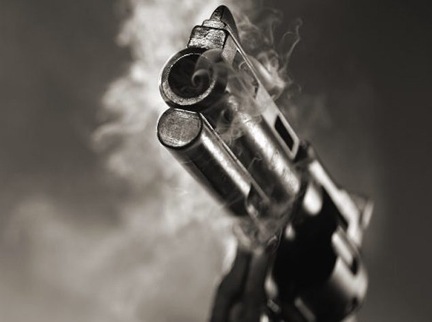(单词翻译:单击)
听力文本
Now, VOA Learning English program, Words and Their Stories.
On this show, we are like word detectives. And like a good detective, we uncover the stories behind common phrases in American English. Today we will investigate phrases and expressions that use the word "smoke."
Police officers and detectives often share a problem while investigating a crime. They may catch someone they suspect is guilty. But they cannot send the person to prison unless they can prove guilt to a judge or jury.
That is why police will often say they are searching for "a smoking gun." The smoking gun is evidence that proves a person's guilt.

The expression gets its name from the smoke that rises from the gun after it is fired. The person holding the gun may try to deny they fired it. But anyone seeing the smoke knows the weapon was used. And if someone is lying dead across the room with a bullet wound, the smoking gun proves who did the shooting.
The writer Arthur Conan Doyle knew about smoking guns. He used the expression in 1893 in one of his stories about the famous detective Sherlock Holmes.
In the story, a group of sailors rebel against the captain of a ship. Sherlock Holmes and others find the captain lying over a map, dead. Standing across from him is a clergyman with a gun in his hand. And not just any gun: a smoking gun.
The clergyman has just shot the captain! The smoking gun proves he is not a man of God, but a murderer.
However, there does not have to be a murder for there to be a smoking gun. In recent years, the expression "smoking gun" has come to mean any strong piece of evidence.
In the early 1970s, for example, many Americans suspected President Richard Nixon was covering up illegal activities by his aides. However, the president denied involvement in any crime. And there was no firm evidence tying him to criminal activity.
In the end, the Nixon White House gave Congress tape recordings that proved he had tried to hide information about the illegal activities. The release of the tapes forced him to resign from office.
Both politicians and the press called these Nixon's smoking gun. They firmly tied him to a break-in at the Watergate building in Washington. Americans still call them Nixon's smoking-gun tapes.
A politician or anyone involved in illegal activities can use a smoke screen to hide behind.
In the military, a "smoke screen" is a cloud of smoke created to hide military operations.
In conversation, a "smoke screen" is something that you do or say to take attention from something else or to hide your real purpose or intention.
If a smoke screen doesn't work, you may want to use smoke and mirrors to hide your criminal behavior.
Years ago, magicians would use smoke and mirrors to fool their audiences. These days in conversation "smoke and mirrors" is anything people do to try and fool someone else.
However, if you are trying to hide a crime, your opponents or the police may try to smoke you out. To smoke someone out means to try to get them to come out of hiding. This comes from the practice of actually using smoke to make people leave an area.
"Smoke out" can also mean to bring someone or something into public view. The media is usually quick to smoke out a scandal. In the Watergate scandal, two Washington Post reporters, Bob Woodward and Carl Bernstein, were the primary people responsible for smoking out Nixon's role in the cover up.
Even when Woodward and Bernstein did not have the tapes in their possession, they probably knew very early that something was wrong. As we say, "where there's smoke, there fire." This expression means that if unpleasant things are said about someone or something, there is probably good reason for it. You may also hear it said this way: "There isn't smoke without fire."
After the public found out about the smoking-gun tapes, all the work Nixon tried to do during his presidency went up in smoke. If something goes up in smoke it is all wasted. When most people think of Nixon, they think of Watergate.
And that brings us to the end of this Words and Their Stories. If you learned even one new expression on this program, your time with us did not go up in smoke. It was not wasted!
Join again next time as we explore more American English on Words and Their Stories.
I'm Anna Matteo.
重点解析
1.across from 在······的对面;在······另一边
An ugly shopping centre stands across from one of the few buildings with character.
一座难看的购物中心对面,耸立着为数不多的几幢别具特色的大楼之一。
2.a man of God (基督教的)牧师,神父
A man of God has the authority of God behind him.
一个属神的人,必有神的权威在背后支持着他。
3.firm evidence 确凿的证据
There is no firm evidence to back up the charge.
没有可靠的证据支持指控。
4.cover up 隐藏; 掩盖
They knew they had done something terribly wrong and lied to cover it up.
他们知道已犯下了大错,并撒谎来掩盖这一错误。
参考译文
这里是VOA学英语《词汇掌故》节目。
本期节目,我们就像文字侦探一样。正如一个好的侦探那样,我们揭露常见美语短语背后的故事。今天我们要调查含有单词“smoke”的短语和表达。
警察和侦探在调查犯罪的时候经常都会遇到个问题。他们也许抓住了犯罪嫌疑人,但是除非他们能向法官或者陪审团证明那个人有罪,否则他们都无法将嫌犯关进监狱。
这就是警察经常说他们正在搜寻“犯罪证据(a smoking gun)”。“smoking gun”是证明某人犯罪的证据。
这个短语源自枪在发射之后升起的烟。持枪的人可能努力否认开了枪。但是任何人看见冒的烟就知道这个武器被用过了。如果某人横躺在房间里,身上带有子弹伤口,冒烟的枪能证明是谁开的枪。
作家阿瑟·柯南·道尔了解犯罪证据。他在1893年的其中一篇名侦探夏洛克·福尔摩斯的故事中使用了这个表达。
故事里,一群水手反抗船长。夏洛克·福尔摩斯和其他人发现船长躺在一张地图上,死了。站在对面的是一个拿着枪的牧师。不仅仅是枪:是一把冒烟的枪。
这个牧师刚开枪打死了船长!冒烟的枪证明他不是一个牧师,而是杀人凶手。
然而,有冒烟的枪不一定就代表有谋杀。近年来,短语“smoking gun”意思是指任何有力的证据。
在20世纪70年代早期,例如,许多美国人怀疑尼克松总统通过他的助手掩盖非法活动。但总统否认自己参与了任何犯罪活动。并且没有任何确凿的证据证明他和犯罪活动有关。
最后,白宫把证明尼克松试图隐藏非法活动信息的录音磁带递交给了国会。磁带的公开迫使尼克松辞去总统职位。
政客和媒体把这些称作尼克松的罪证。它们强有力地证明了尼克松与华盛顿水门大厦的入室窃听事件有关联。美国人仍然称它们为尼克松的罪证磁带。
政客或者任何参与非法活动的人可以放烟幕弹来隐藏自己。
在军队,“烟幕”是指为了隐藏军事行动而制造的一团烟雾。
在交谈中,烟幕是指你做某事或者说什么来吸引人们注意其他事物或者隐藏你的真实目的或者意图。
如果烟幕弹不好使,你也许通过想混淆是非(smoke and mirrors)来隐藏你的犯罪行为。
许多年前,魔术师会用烟雾和镜子来愚弄观众。现在在交谈中,“smoke and mirrors”是指人们做的任何试图愚弄他人的行为。
然而,如果你试图隐藏犯罪,你的对手或者警察会设法揭发你的罪行( smoke you out)。“To smoke someone out”意思是设法让他们不再躲藏。短语来源于用烟雾让某人离开某地的行为。
“Smoke out”也能指让某人或者某物进入大众视野。传媒通常能很快将一个丑闻公之于众。在水门事件丑闻中,两个华盛顿邮报记者,鲍勃·伍德沃德和卡尔·伯恩斯坦,这两名记者是揭发尼克松参与掩盖事件的主要人物。
即使伍德沃德和伯恩斯坦没有磁带,他们也许早已知道事情不对劲。正如我们所说,“无风不起浪(where there's smoke, there fire.)”这个短语意思是如果大家说某人或者某物不好的方面,也许是有合理的理由的。你也许它的另一个说法:“无火不生烟。(There isn't smoke without fire.)”
在公众得知罪证磁带之后,尼克松在担任总统期间所做的一切努力都化为乌有(went up in smoke)。如果某物化为乌有,那就都白费了。当人们想到尼克松,他们会想到水门事件。
到了节目尾声啦。如果你在节目中只学会了一个新的表达,你和我们一起的时光就没有付之一炬,没有白费!
参与我们的下期《词汇掌故》节目,探索更多美式英语。
我是安娜·马特奥。


